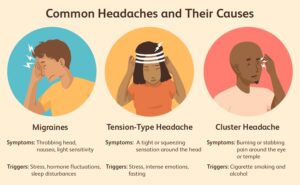
Headaches are a common ailment that most individuals experience at some point in their lives. While many headaches are benign and can be managed with lifestyle changes or over-the-counter medications, others may signal underlying health issues requiring medical evaluation. This comprehensive guide delves into the various types of headaches, their potential causes, and when it’s crucial to consult a healthcare professional.
Common Types of Headaches and Their Causes
1. Migraine
Migraines are intense, throbbing headaches often accompanied by nausea, vomiting, and sensitivity to light and sound. They can last from a few hours to several days and may be preceded by visual disturbances known as auras. Triggers include hormonal changes, certain foods, stress, and sensory stimuli.
2. Tension Headaches
Tension headaches are the most prevalent type, characterized by a dull, aching sensation on both sides of the head. They often result from stress, poor posture, or muscle strain. These headaches are typically mild to moderate in intensity and can last from 30 minutes to several hours.
3. Sinus Headaches
Sinus headaches occur due to inflammation or infection of the sinus cavities, leading to pressure and pain in the forehead, cheeks, and around the eyes. They are often accompanied by nasal congestion, fever, and facial swelling.
4. Cluster Headaches
Cluster headaches are severe, one-sided headaches that occur in cyclical patterns or clusters. They are characterized by intense pain around one eye, often accompanied by redness, tearing, and nasal congestion. These headaches can last from 15 minutes to three hours and may occur multiple times a day.
5. Headaches Due to Head Trauma
Headaches resulting from head injuries can range from mild to severe and may indicate a concussion or more serious conditions like intracranial bleeding. Symptoms such as confusion, dizziness, or loss of consciousness necessitate immediate medical attention.
6. Headaches from Neurological Disorders
Certain neurological conditions, including multiple sclerosis, Parkinson’s disease, or stroke, can manifest as headaches. These headaches are often accompanied by other neurological symptoms like numbness, vision changes, or difficulty speaking.

When to Consult a Healthcare Professional
While occasional headaches are common, certain signs indicate the need for medical evaluation:
-
Sudden, severe headaches described as “the worst headache ever.”
-
Headaches accompanied by fever, stiff neck, confusion, seizures, or double vision.
-
Persistent headaches that worsen over time or don’t respond to standard treatments.
-
Headaches following a head injury.
-
New headaches in individuals over 50 years old.
-
Headaches that disrupt daily activities or sleep.

Effective Strategies to Alleviate Headaches
-
Hydration: Ensure adequate water intake to prevent dehydration-induced headaches.
-
Rest: Taking breaks and resting in a quiet, dark environment can alleviate tension and migraine headaches.
-
Over-the-Counter Medications: Analgesics like acetaminophen or ibuprofen can be effective for mild to moderate headaches.
-
Cold or Warm Compresses: Applying a cold compress can reduce inflammation, while a warm compress can relax tense muscles.
-
Regular Exercise: Engaging in physical activity can reduce stress and improve overall well-being, potentially decreasing headache frequency.
-
Sleep Hygiene: Maintaining a consistent sleep schedule and creating a restful environment can prevent sleep-related headaches.
-
Stress Management: Practices like meditation, deep breathing, or yoga can help manage stress, a common headache trigger.
-
Professional Consultation: If headaches persist or worsen, seeking medical advice is essential for proper diagnosis and treatment.
Conclusion
Understanding the various types of headaches and their potential causes is crucial for effective management and treatment. While many headaches can be addressed with lifestyle modifications and over-the-counter remedies, persistent or severe headaches warrant medical evaluation to rule out underlying conditions.




